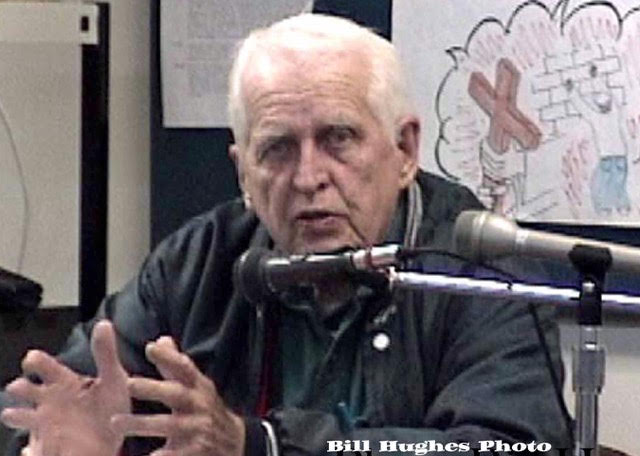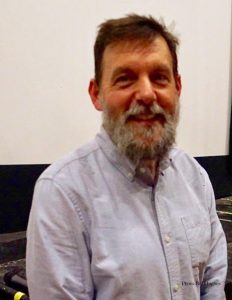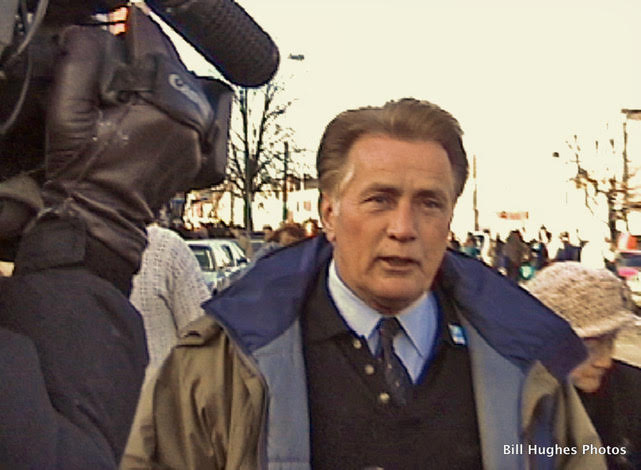Anti-war movement film ‘1971’ at Charles Theatre
The anti-war film, “1971,” was shown Monday at the Charles Theatre before a large audience. The compelling documentary, which focused on a break-in by antiwar activists of an FBI office in Media, PA, on March 8, 1971, was produced by Johanna Hamilton. It will show only this one time in Baltimore. It was part of the “50th Anniversary of the Catonsville Nine’s Resisting War Film Series.”
For many reasons, the “Catonsville Nine” case became the “cause celebre” for the non-violent war and resistance movement. Two of its members, both Catholic priests, Dan Berrigan, a Jesuit, and his brother, Phil, became well-known public figures as a result of this daring action. Phil Berrigan later left the priesthood. He was a member of the Josephite Fathers and a WWII veteran who fought in the Battle of the Bulge.

Around that same time, the hierarchy of the Catholic Church in the U.S. was extremely conservative and mostly went along with the Vietnam War, as many of them did with the more recent Iraq conflict. The reactionary Cardinal Francis Spellman of NYC was their titular leader at that time of the Vietnam War. He never saw a war or weapon system he couldn’t bless.
After the murder of President John F. Kennedy on Nov. 22, 1963, the U.S. buildup of combat troops in Vietnam increased dramatically. First, under President Lyndon B. Johnson and then continuing under Richard M. Nixon’s demented presidency (1969-74). The latter barely escaped impeachment before resigning his office.
The actor Martin Sheen, also an antiwar activist, was a colleague of Phil Berrigan. He attended his funeral in Baltimore, in 2002. Sheen labeled the “Catonsville Nine” action, the “single most powerful antiwar act in American history.” I’m inclined to agree with Sheen, but others – a minority – have seen it differently.
The backdrop for the “Draft Resistance Movement,” especially on the Catholic Left, was the illegal and immoral Vietnam War (1963-1975). Over 58,000 of our finest sons and daughters died in that lethal conflict, with 303,000 more casualties. Congress had failed to “declare war,” as required under the U.S. Constitution, instead of the pro-war elements in the government, the Military-Industrial Complex, and in “Deep State,” relied on the legally-suspect “Gulf of Tonkin Resolution” to justify their actions. The Resisters considered the war not only immoral but illegal as well.
Getting back to the film, the “Washington Post,” opened the floodgates by publishing most of the stolen files from the break-in, at Media, PA. Other newspapers, like the “New York Times,” and a host of TV stations, soon joined in by also publishing the material seized. The FBI, under its then czar-like Director, J. Edgar Hoover, was also outraged by the newspapers’ collective actions and threatened prosecutions.
The highly-secret cache revealed the FBI was running “a vast and illegal regime of spying and intimidation of Americans, who were exercising their First Amendment rights.” The FBI’s name for its patently illegal operation: “COINTELPRO.”
Media, PA is a town located on the outskirts of Philadelphia. The activists revealed in the film that they chose it as a site for a break-in because this particular FBI office was located in a building with little or no security. They carefully planned the break-in. They were never caught or prosecuted for their offenses. Nobody squealed either. They were careful to wear gloves and left no fingerprints. The statute of limitation has long since passed for any criminal prosecution of the defendants to take place.
One of the participants in the Media action was Keith Forsyth who actually “broke the lock,” to get into the building. He was present at the viewing of the documentary at the Charles. Forsyth, also a member of the “Camden 28” action, took part in the lively Q&A session that followed the film’s presentation. Steve Sachs, former U.S. Attorney for Maryland, (1967-70), joined in the post-movie discussion as well.

Mr. Sachs was the federal prosecutor in charge of the Catonsville Nine case, although he wasn’t one of its “trial attorneys.” He did, however, personally prosecute another case, the “Baltimore Four,” (10.27.67), which did involved destruction of government draft records by “pouring blood on them” at the Customs House. One of the “Baltimore Four” was in the audience, the poet, David Eberhardt. Another defendant, in that case, was the late Phil Berrigan.
Moderating the Q&A session was Joe Tropea, who co-produced the popular documentary, “Hit & Stay,” which covered not only the Catonsville Nine case but other antiwar actions during that same period. There were reportedly 271 draft board raids in the U.S. between 1968-71. “Hit & Stay” was also shown at the Maryland Film Festival, along with Tropea’s “Sickies Making Films,” which dealt with film censorship in Maryland.

The spirited Q&A session went on for about an hour. Folks in the audience, like local peace activist, Max Obuszewski, had more than one question to ask, as did others from the Peace Community.
Sachs said, with respect to the break-ins and destruction of draft records cases, that you “open the door to a lawless society,” if you pick and choose what case to prosecute based on the motives, no matter how honorable, of the defendants. Motives, he added, are important only at sentencing for the court to consider, however, they have no role to play in the bringing of a criminal action.
Forsyth countered by saying, it all comes down to what is the “right or the wrong” thing to do for an individual under the circumstances. A person has to decide for him or herself: “Am I on the right or wrong side of humanity on this issue?”
Citing the desperate situation that the Jews found themselves in WWII, in France, under the “Vichy Regime” (1940-45). Forsyth said the democratically sourced government in that country had decided “to round up” its Jewish population for deportation back to Nazi Germany. An individual back then, Forsyth underscored, had to decide for himself either to “resist those laws,” or to go along with them. Were those laws – right or wrong? “It was that simple,” concluded Forsyth.
The “Camden 28” case also came under discussion. This anti-draft board action took place in 1971, in Camden, NJ. All 28 defendants were found “not guilty” by a jury in 1973. Forsyth said that a few of the jury members told him after the acquittal, that they decided on a “not guilty” verdict because they believed the “Vietnam War was wrong.”
It also turned out that one of the 28 defendants was “an informant” for the FBI and that he had been involved in the “planning and training perspective” of the action. That was more than enough to convince the jury to acquit the defendants. Some have called the verdict in the “Camden 28” case, a classic example of “jury nullification!”
Finally, the presentation of the film, “1971,” at the Charles, in light of the current political situation in this country, was, indeed, a fitting way to round out the 50th anniversary of the “resisting war films series.”

Bill Hughes is an attorney, author, actor and photographer. His latest book is “Byline Baltimore.” It can be found at: https://www.amazon.com/William-Hughes/e/B00N7MGPXO/ref=dp_byline_cont_book_1


The showing of the documentary “1971” about the break into of the FB I office at Media Pa, at the Charles with discussion afterwards, featuring ex prosecutor and current lawyer at Wilmer Hale Steve Sachs and Media and Camden 28 member Keith Forsythe was the best for me, in that it got to the nub of many complicated legal questions. The movie even moved Sachs, and seemed, like “Hit and Stay” a blue print for further action in the midterms against trump and the republicans.
How was I to feel about some one who sent me to prison for 21 months? I always admired Sachs intellect, but find him some what ossified in old age- unable to change- still defending the “rule of law”.
Sachs was his wily and sophist self. I realized that to be a prosecutor or judge in this society means you would have to quit. Sachs has made his bed well and lain in it well, even running for governor. Many fine questions were posed to him but he sophisticated his way out of most- zingers tho they were. Dave Goldsmith almost cornered the slick one.
Take Sachs on abortion- how he would have to prosecute pro lifers who attacked a Planned Parenthood office thus protecting the “law”. Yes but if you apply the law to protect life (and consider a life to begin at conception) then what. What if you, like me, will not preach to a woman? Yes it gets complicated but Sachs is too weasily to say that a courtroom is not the place to make change. Here’s a bon mot for you: “Kill all the lawyers”
At the end I realized and said to him. We (meaning we activists) have a higher calling. How many radical judges or prosecutors do you know or have heard of?
Defending bad law is indefensible in the end. Law protecting power as in the 3rd reich or Jim Crow south must be disobeyed and changed. Sachs made very interesting points about jury nullification and why it is not allowed by judges although practiced by many juries. He does not follow a higher moral law nor the laws of war, not even, as Max Obuszjewski (Max get a better spelling) (maybe “Obee) pointed out- the constitution! The Vietnam War was not approved by congress- thus Sachs was defending an illegal war!
At the end, as Ellen Barfield points out, he admitted he could recognize the good as he told us of his defense of Elizabeth Morgan in her child custody case. Of course how good a defense lawyer was he? She got 27 months!
Also Sachs defense of allowing the “Our Father” during the trial of the 9 was telling- he has his good side.
In my opinion, Keith Forsyth stole the show and in the movie with his locksmith expertise and exposing the illegality of the fbi, now sadly in a way under attack by a certifiable criminal- trump.
Keith you skated free from two briar patches (to mix the metaphor)- Media and Camden and I had to molder at Lewisburg federal prison. When I grow up I want to be like Keith.
Dave Eberhardt, Baltimore 4